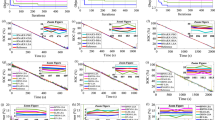Abstract
This article presents the overall review analysis of intelligent monitoring of electric vehicle using different soft computing techniques. It begins with the modeling of electric vehicle. Thereafter, different soft computing techniques were proposed to get the best results for the performance of EV, and it is observed that machine learning of charging gives the best results as compared to other techniques for the charging and discharging of battery in terms of less time with proper quality.
Access this chapter
Tax calculation will be finalised at checkout
Purchases are for personal use only
Similar content being viewed by others
References
Martel F, Kelouwani S, Dubé Y, Agbossou K (2015) Optimal economy-based battery degradation management dynamics for fuel-cell plug-in hybrid electric vehicles. J Power Sources 274:367–381
Mi C, Masrur MA, Gao DW (2011) Hybrid electric vehicles: principles and applications with practical perspectives. Wiley, Hoboken, NJ, USA
Bohn T, Glenn H (2016) A real world technology testbed for electric vehicle smart charging systems and perverse interoperability evaluation. In: 2016 IEEE energy conversion congress and exposition (ECCE), pp 1–8
Adil M, Ali J, Ta QTH, Attique M, Chung T-S (2020) A reliable sensor network infrastructure for electric vehicles to enable dynamic wireless charging based on machine learning technique. IEEE Access 8(6)
Chen Z, He F, Yin Y (2016) Optimal deployment of charging lanes for electric vehicles in transportation networks. Transp Res B, Methodol 91:344–365
Brecher A, Arthur D (2014) Review and evaluation of wireless power transfer (WPT) for electric transit applications. U.S. Dept. Transp., Fed. Transit Admin., Washington, DC, USA, FTA Rep. 0060
Ko YD, Jang YJ (2013) The optimal system design of the online electric vehicle utilizing wireless power transmission technology. IEEE Trans Intell Transp Syst 14(3):1255–1265
Lukic S, Pantic Z (2013) Cutting the cord: static and dynamic inductive wireless charging of electric vehicles. IEEE Electrific Mag 1(1):57–64
Chopra S, Bauer P (2013) Driving range extension of EV with on-road contactless power transfer—a case study. IEEE Trans Ind Electron 60(1):329–338
Jang YJ, Jeong S, Ko YD (2015) System optimization of the on-line electric vehicle operating in a closed environment. Comput Ind Eng 80:222–235
Malek YN, Najib M, Bakhouya M, Essaaidi M (2021) Big data mining and analytics. Multivariate deep learning approach for electric vehicle speed forecasting, TUP 4(1)
Hwang I, Jang YJ, Ko YD, Lee MS, System optimization for dynamic wireless charging electric vehicles operating in a multiple-route environment. IEEE Trans Intell Transp Syst to be published
Xu B, et al (2013) Degradation-limiting optimization of battery energy storage systems operation. M.S. thesis, Power System Laboratory, ETH Zürich, Zürich, Switzerland
Omar N et al (2014) Lithium iron phosphate based battery–assessment of the aging parameters and development of cycle life model. Appl Energy 113:1575–1585
Zheng Y, Luo J, Yang X, Yang Y (2020) Intelligent regulation on demand response for electric vehicle charging: a dynamic game method. IEEE Access 8
Kamal E, Adouane L (2018) Intelligent energy management strategy based on artificial neural fuzzy for hybrid vehicle. IEEE Trans Intell Veh 3(1):112–125. https://doi.org/10.1109/tiv.2017.2788185
Green JM, Hartman B, Glowacki PF (2016) A system-based view of the standards and certification landscape for electric vehicles. World Electric Vehicle J 8(2):564–575. [Online]. Available: http://www.mdpi.com/2032-6653/8/2/564
Zhang K, Yin Z, Yang X, Yan Z, Huang Y (2017) Quantitative assessment of electric safety protection for electric vehicle charging equipment. In: 2017 international conference on circuits, devices and systems (ICCDS), pp 89–94
Falvo MC, Sbordone D, Bayram IS, Devetsikiotis M (2014) EV charging stations and modes: international standards. In: 2014 international symposium on power electronics, electrical drives, automation and motion, pp 1134–1139
Freschi F, Mitolo M, Tommasini R (2018) Electrical safety of plug in electric vehicles: shielding the public from shock. IEEE Ind Appl Mag 24(3):58–63
Wogan M (2016) Electric vehicle charging safety guidelines. WorkSafe New Zealand. [Online]. Available: https://worksafe.govt.nz/laws-and-regulations/regulations/electrical-regulations/regulatory-guidance-notes/electric-vehicle-charging-safety-guidelines/
Ghavami M, Esakkiappan S, Singh C (2016) A framework for reliability evaluation of electric vehicle charging stations. In: 2016 IEEE power and energy society general meeting (PESGM), pp 1–5
Risk control—fire safety when charging electric vehicles. UK Fire Protection Association
Affonso CM, Yan Q, Kezunovic M (2018) Risk assessment of transformer loss-of-life due to PEV charging in a parking garage with PV generation. In: 2018 IEEE power energy society general meeting (PESGM), pp 1–5
Naveen G, Yip TH, **e Y (2014) Modeling and protection of electric vehicle charging station. In: 2014 6th IEEE power india international conference (PIICON), pp 1–6
Nie X, Liu J, Xuan L, Liang H, Pu S, Wang Q, Zhou N (2013) Online monitoring and integrated analysis system for EV charging station. In: IEEE PES Asia-Pacific power and energy engineering conference, pp 1–6
**n S, Guo Q, Sun H, Zhang B, Wang J, Chen C, Cyber-physical modeling and cyber-contingency assessment of hierarchical control systems. IEEE Trans Smart Grid
Hu Y, Chen C, He T, He J, Guan X, Yang B (2019) Proactive power management scheme for hybrid electric storage system in EVs: an MPC method. IEEE Trans Intell Transp Syst 1–12. https://doi.org/10.1109/tits.2019.2952678
Author information
Authors and Affiliations
Corresponding author
Editor information
Editors and Affiliations
Rights and permissions
Copyright information
© 2023 The Author(s), under exclusive license to Springer Nature Singapore Pte Ltd.
About this paper
Cite this paper
Saxena, A., Kumar, R., Singh, J., Kumari, S., Verma, M., Kumari, P. (2023). A Soft Computing Intelligent Technique Implication for the Comprehensive Audit of Electric Vehicle. In: Agrawal, R., Mitra, P., Pal, A., Sharma Gaur, M. (eds) International Conference on IoT, Intelligent Computing and Security. Lecture Notes in Electrical Engineering, vol 982. Springer, Singapore. https://doi.org/10.1007/978-981-19-8136-4_15
Download citation
DOI: https://doi.org/10.1007/978-981-19-8136-4_15
Published:
Publisher Name: Springer, Singapore
Print ISBN: 978-981-19-8135-7
Online ISBN: 978-981-19-8136-4
eBook Packages: Computer ScienceComputer Science (R0)




